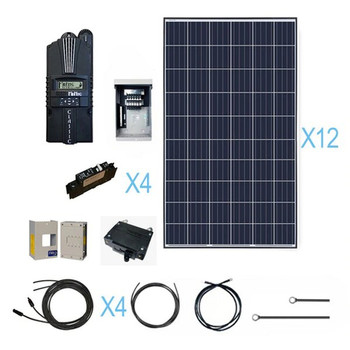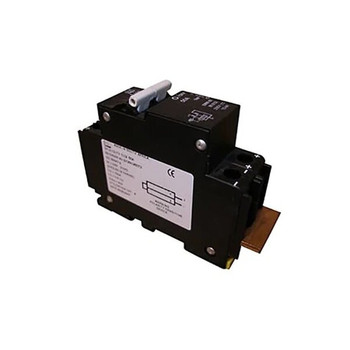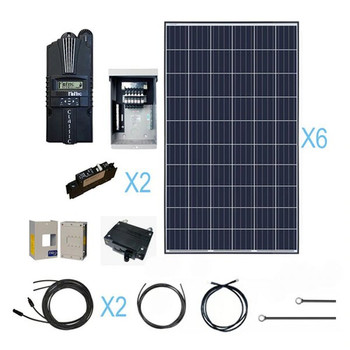SOLAR KITS
-


Go Power!
$2,589.99Go Power! 500 Watt Flexible Solar Kit Perfect for RV’s and boats, its flexible design can conform to almost any surface. The panels are only 3 mm thick, making them easy to install. The thin, lightweight design provides a low profile, which is...$2,589.99 -


Go Power!
$789.99Go Power! 100 watt Flexible Solar Kit The Go Power! 100-watt flexible solar kit includes a Solar Flex™ panel that is aerodynamic and DURABLE—a low-profile and bendable solar battery charger for RVs, boats, work trucks, long-haul...$789.99 -


Renogy
$177.99Renogy 100 Watt 12 Volt Flexible Monocrystalline Solar Panel Traditional solar panels are rigid and often enclosed in tempered glass. The Renogy 100W Flexible Solar Panel is anything but traditional. Perfect for marine use or placement on top...$177.99 -


Renogy
$749.99Renogy 350 Watt Solar Flexible Kit Renogy’s Flexible Kits are back and better than ever! Adding solar to your application is a breeze since we've included the necessary components to get you started on your solar quest to eliminate the...$749.99 -


Renogy
Renogy 4500 Watt 48 Volt Monocrystalline Solar Cabin Kit A Solar Cabin Kit is perfect for use on an off-grid garage, work shed, or cabin. Installing one of these kits will allow you to run various appliances throughout the day, depending on their... -


Renogy
Renogy 3600 Watt 48 Volt Monocrystalline Solar Cabin Kit A Solar Cabin Kit is perfect for use on an off-grid garage, work shed, or cabin. Installing one of these kits will allow you to run various appliances throughout the day, depending on their... -


Renogy
Renogy 3200 Watt 48 Volt Polycrystalline Solar Cabin Kit A solar cabin kit is perfect for use on an off-grid garage, work shed, or cabin. Installing one of these kits will allow you to run various appliances throughout the day, depending on their... -


Renogy
Renogy 2700 Watt 48 Volt Monocrystalline Solar Cabin Kit A Renogy Solar Cabin Kit is a great power solution for any off-grid cabin or work shed. Unlike traditional power generators, solar panels silently recharge batteries and rely on a completely... -


Renogy
Renogy 2400 Watt 24 Volt Monocrystalline Solar Cabin Kit Enjoy some of the comforts of home while vacationing or working off-grid. Renogy Cabin Kits are off-grid solar power systems designed for charging a battery bank. The battery bank is charged... -


Renogy
Renogy 2400 Watt 48 Volt Polycrystalline Solar Cabin Kit A Renogy Solar Cabin Kit is a great power solution for any off-grid cabin or work shed. Unlike traditional power generators, solar panels silently recharge batteries and rely on a completely... -


Renogy
Renogy 2100 Watt 24 Volt Polycrystalline Solar Cabin Kit Enjoy some of the comforts of home while vacationing or working off-grid. Renogy Cabin Kits are off-grid solar power systems designed for charging a battery bank. The battery bank is charged... -


Renogy
Renogy 1600 Watt 24 Volt Polycrystalline Solar Cabin Kit If you are looking to power a large off-grid system with ability and options for expansion then the Renogy 1600W Polycrystalline Solar Cabin Kit is perfect for you. The Cabin Kit is designed...
Get everything you need to set up your solar energy system for your RV or boat with our comprehensive solar packages. They typically include solar modules, mounting equipment, amp controller, and other basic accessories for making it easy to get renewable energy while on-the-go. We carry only the highest quality RV solar kits or boat solar kits. These solar kits are from quality brands such as Rich and Renogy.
Frequently Asked Questions About RV and Marine
A: Solar power installation in RVs and boats refers to the process of adding solar panels and related equipment to these vehicles to generate electricity from the sun. The solar panels absorb sunlight and convert it into electricity that can be used to power various appliances and devices.
A: Installing solar power in an RV or boat can provide several benefits, including:
- Cost savings: By generating electricity from the sun, RV and boat owners can reduce their reliance on generators or shore power, which can save them money on fuel and dock fees.
- Environmental benefits: Solar power is a clean and renewable source of energy, so using it to power an RV or boat can help reduce the carbon footprint of these vehicles.
- Convenience: With a solar power system installed, RV and boat owners can have a reliable source of electricity wherever they go, without having to worry about finding an electrical outlet or running out of fuel for their generator.
A: The main components of a solar power installation in an RV or boat include:
- Solar panels: These are the devices that absorb sunlight and convert it into electricity.
- Charge controller: This device regulates the flow of electricity from the solar panels to the batteries, preventing overcharging and other issues.
- Batteries: The electricity generated by the solar panels is stored in batteries, which can be used to power appliances and devices.
- Inverter: This device converts the DC power from the batteries into AC power that can be used to power standard household appliances.
- Wiring and connectors: These components are used to connect all of the components of the solar power system together.
A: The amount of solar power needed for an RV or boat depends on several factors, including the size of the vehicle, the amount of electricity needed, and the amount of sunlight available in the area where the vehicle will be used. A professional solar installer can help determine the appropriate size and configuration of the solar power system for a particular RV or boat.
A: The number of solar panels needed will depend on the energy needs of the RV or boat. A typical RV may require 200-400 watts of solar power, while a larger boat may require 500-1000 watts or more. It's important to calculate the energy needs of the RV or boat to determine how many solar panels are needed.
A: Solar panels can be mounted on the roof of an RV or boat using mounting hardware that is specifically designed for the application.
A: While it is possible to install a solar power system in an RV or boat yourself, it is recommended that you hire a professional solar installer. Solar installations can be complex and involve working with electrical components, so it is important to ensure that the system is installed safely and correctly.
A: The cost of installing a solar power system in an RV or boat varies depending on the size and complexity of the system, as well as the specific components used. A small, basic system can cost a few thousand dollars, while a larger and more complex system can cost tens of thousands of dollars. It is important to get a quote from a professional solar installer to determine the specific cost for a particular RV or boat.
A: Yes, there are some maintenance requirements for a solar power system in an RV or boat. These can include cleaning the solar panels occasionally to ensure they are free of dirt and debris, checking the charge controller and batteries periodically to ensure they are functioning properly, and inspecting the wiring and connectors for signs of wear or damage. It is important to follow the manufacturer's guidelines for maintenance to ensure the system remains safe and efficient.
